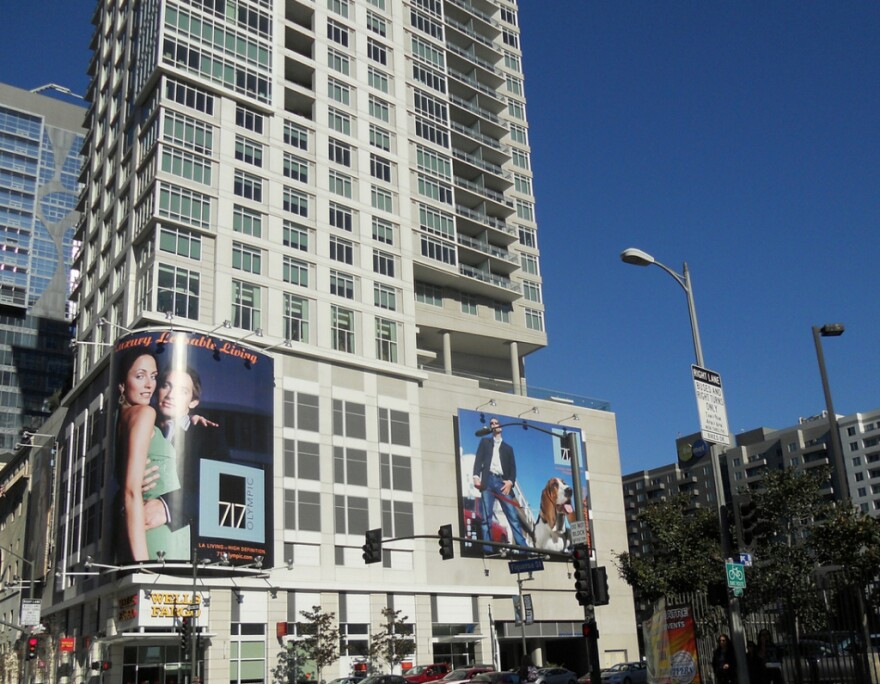This story is free to read because readers choose to support LAist. If you find value in independent local reporting, make a donation to power our newsroom today.
This archival content was originally written for and published on KPCC.org. Keep in mind that links and images may no longer work — and references may be outdated.
Are large-scale housing developments good for LA?

Los Angeles has seen a wave of so-called mega-developments in recent years. It's led preservationists, affordable housing advocates and labor leaders into a debate on how to rein in the construction of housing that is so big that it requires a change to zoning rules. But those groups have different reasons for opposing development, and they're split on how to restrict it.
In the coming year, those groups will make their case to L.A. voters, with two different ballot campaigns that aim to control new construction in the city.
The Build Better LA campaign, led by a coalition of labor unions and affordable housing advocates, is pushing to get a question before voters this November that would make developers who want zone changes include a certain amount of below-market rate housing in their buildings, and to pay construction workers union-level wages.
Meanwhile, the Neighborhood Integrity Initiative, spearheaded by the AIDS Healthcare Foundation, is aiming for a two-year moratorium on larger developments, which backers say will help traffic and preserve neighborhood character. Its leaders announced this week that they would try to get the issue before voters in March of 2017, instead of November as previously planned, because the ballot will be less crowded.
Carol Schatz of the Central City Association, which represents downtown developers, said that both proposals will hurt the local economy, but especially the moratorium idea.
"It cripples new housing development and it really imposes our own recession here in L.A. well before one is on the horizon," Schatz said.
Because members of Build Better LA also oppose a moratorium, Schatz said they should focus their energies on defeating that. Already, labor unions and affordable housing advocates have joined forces with the business community to fight the moratorium idea as part of the Coalition to Protect L.A. Neighborhoods and Jobs.
But Laura Raymond of the Build Better LA campaign said her group can fight the moratorium plan without abandoning its own initiative.
"L.A. is increasingly getting more and more expensive," Raymond said. "The affordable housing crisis has really hit a point where we feel now is when we absolutely have to take action."
John Schwada, a spokesman for the pro-moratorium Neighborhood Integrity Initiative, contends that its measure, aside from trying to improve quality of life for Angelenos, also encourages affordable housing. His group recently re-wrote its moratorium proposal to exclude housing complexes that are 100 percent “affordable.” And, the group argues that a moratorium on “mega-developments” will help lower-income renters who would otherwise be displaced by them.
Some of those projects “push people off their affordable housing units to make way for luxury units,” Schwada said.
Both initiatives have a ways to go. Schwada said his group has to re-start the signature-gathering process now that it’s changed the planned date for its ballot question to March. Build Better LA said it's still early in its signature drive.
Build Better LA’s Raymond said that having one question relating to development on the November ballot could work to her group's advantage.
Raphael Bostic of the USC Price School agreed it should be less confusing to voters than if there were two measures. But he questioned if it would pass. He noted that the city recently raised its minimum wage, and a ballot question requiring prevailing wages might not play as well.
"This would be another effort that might be perceived as not business-friendly, and (voters) might shy away from positioning the city as anti-business," Bostic said.
Correction: An earlier version of this story misspelled Raphael Bostic's first name. We regret the error.








